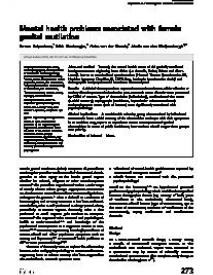Mental health problems associated with female genital mutilation.
Aims and method
To study the mental health status of 66 genitally mutilated immigrant women originating from Africa (i.e. Somalia, Sudan, Eritrea and Sierra Leone). Scores on standardised questionnaires (Harvard Trauma Questionnaire-30, Hopkins Symptom Checklist-25, COPE-Easy, Lowlands Acculturation Scale) and demographic and psychosocial correlates were analysed.
Results
A third of the respondents reported scores above the cut-off for affective or anxiety disorders; scores indicative for post-traumatic stress disorder were presented by 17.5% of women. Type of circumcision (infibulation), recollection of the event (a vivid memory), coping style (avoidance, in particular substance misuse) and employment status (lack of income) were significantly associated with psychopathology.
Clinical implications
A considerable minority group, characterised by infibulated women who have a vivid memory of the circumcision and cope with their symptoms in an avoidant way, reports to experience severe consequences of genital circumcision. In terms of public healthcare, interventions should target these groups as a priority.
Geachte bezoeker,
De informatie die u nu opvraagt, kan door psychotraumanet niet aan u worden getoond. Dit kan verschillende redenen hebben,
waarvan (bescherming van het) auteursrecht de meeste voorkomende is. Wanneer het mogelijk is om u door te verwijzen naar de bron
van deze informatie, dan ziet u hier onder een link naar die plek.
Als er geen link staat, kunt u contact opnemen met de bibliotheek,
die u verder op weg kan helpen.
Met vriendelijke groet,
Het psychotraumanet-team.
In: BJPsych Bulletin, ISSN 2056-4694 | 39 | 6 | 273-277
http://doi.org/10.1192/pb.bp.114.047944


